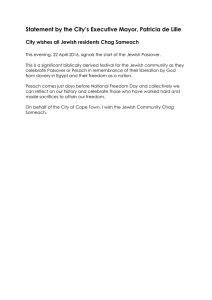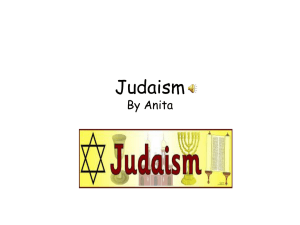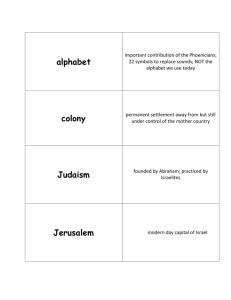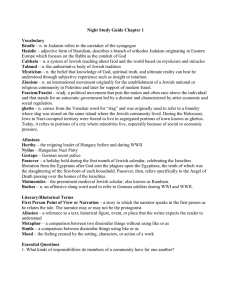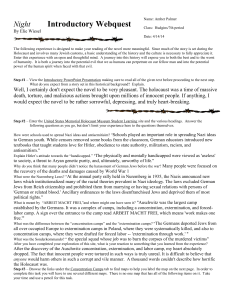SCRIPT 4. Season of Freedom, Season of Rebirth
advertisement
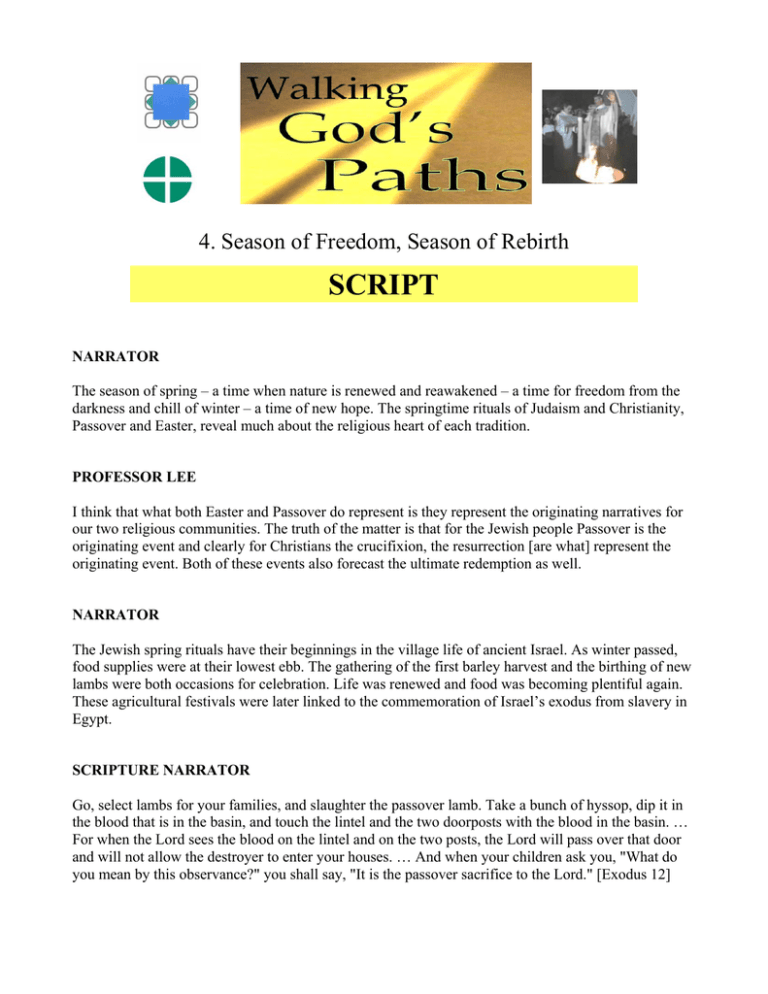
4. Season of Freedom, Season of Rebirth SCRIPT NARRATOR The season of spring – a time when nature is renewed and reawakened – a time for freedom from the darkness and chill of winter – a time of new hope. The springtime rituals of Judaism and Christianity, Passover and Easter, reveal much about the religious heart of each tradition. PROFESSOR LEE I think that what both Easter and Passover do represent is they represent the originating narratives for our two religious communities. The truth of the matter is that for the Jewish people Passover is the originating event and clearly for Christians the crucifixion, the resurrection [are what] represent the originating event. Both of these events also forecast the ultimate redemption as well. NARRATOR The Jewish spring rituals have their beginnings in the village life of ancient Israel. As winter passed, food supplies were at their lowest ebb. The gathering of the first barley harvest and the birthing of new lambs were both occasions for celebration. Life was renewed and food was becoming plentiful again. These agricultural festivals were later linked to the commemoration of Israel’s exodus from slavery in Egypt. SCRIPTURE NARRATOR Go, select lambs for your families, and slaughter the passover lamb. Take a bunch of hyssop, dip it in the blood that is in the basin, and touch the lintel and the two doorposts with the blood in the basin. … For when the Lord sees the blood on the lintel and on the two posts, the Lord will pass over that door and will not allow the destroyer to enter your houses. … And when your children ask you, "What do you mean by this observance?" you shall say, "It is the passover sacrifice to the Lord." [Exodus 12] RABBI ROSENTHAL The most important theme of Passover is freedom. It is described in rabbinic literature as z'man heruteinu, "the time or season of our freedom." And, of course, as the Bible indicates, in Exodus and elsewhere, it commemorates the slavery of the Hebrews in Egypt and their ultimate liberation and freedom under the leadership of Moses. So that’s the most important theme of the holiday. A secondary theme is that it is also the festival of springtime, implying, therefore, regeneration, recreation, renaissance, resurrection, if you will. As the earth comes to life, so our people came to life after their exile in Egypt. NARRATION The Passover meal, the seder, uses special foods symbolically in order to relive the experience of slavery and liberation. PROF. LEVINE It doesn’t simply commemorate what happened years and years ago. Passover, like all Jewish festivals, is an ongoing community based tradition - so that within Jewish homes today, and Passover is a home based celebration, it is essential to have a conversation about what liberation from bondage means today. Not simply bondage to economic concerns or business concerns, but who today is enslaved through poverty, through war, through racism or prejudice, and how it is our duty as freed slaves ourselves to remember these other people who are enslaved and work now for their freedom as well. PROF. KIMELMAN The central theme of Passover is: How can past redemption be so understood that it prefigures future redemption? So if you look at the Haggadah, the central document, indeed one of the most significant aspects of Passover is that the whole ritual takes place in the home. Indeed the importance of Passover in Judaism is the ultimate victory of Rabbinic Judaism because you have almost a sacramental meal -- without a temple and without benefit of the priesthood -- run in the family. So if there ever was a home-centered, family-centered event in Judaism it is in Passover. RABBI LEHMANN There’s a central focus also on the transmission of Jewish identity, that, from one generation to another, or from parent to child, that Passover is the central experience of learning what it means to be a part of this Jewish communal experience. And, probably more than any other holiday, that notion of transmission, that notion of being a part of a community that is teaching and learning, giving and receiving [are] what it means to be a part of this tradition as a central focus. SCRIPTURE NARRATOR In every generation, each of us should feel as though we ourselves had gone forth from Egypt, as it is written: "And you shall explain to your child on that day, it is because of what the Eternal did for me when I, myself, went forth from Egypt." - Passover Haggadah NARRATOR The Passover festival has historical importance for the Christian tradition as well. It was at the time of Passover that Jesus of Nazareth ate a final meal with his friends, was executed by the order of the Roman prefect, and was experienced by his followers as raised to new life. These events of Jesus’ "passion," his passage from death to life, are at the core of Christian liturgy. SR. BOYS text onscreen: Holy Thursday Each year at the conclusion of Lent we begin, in a sense the most sacred reenactment or memorialization of the events of the passion, death, and resurrection of Jesus beginning the evening of Holy Thursday, the Last Supper. Interestingly the gospel on Holy Thursday is not "This is my body, this is my blood," the so-called "words of consecration" from Jesus, but we reenact John 13, the washing of the feet which is a very powerful gospel about service. SR. BOYS text onscreen: Good Friday Then on Good Friday the remembering of the passion of Jesus…We read among other texts, from the passion account of John. SR. BOYS text onscreen: Easter Vigil And then the climax is to be this liturgy of the vigil, which must begin after dark and at the beginning, kindling of the fire. It’s a very beautiful and dramatic liturgy. NARRATOR The Easter Vigil Service is the climax of the church’s liturgical year. After the opening service of light, as many as nine scripture readings pass on the Christian tradition by recounting the story of salvation. Then new members are initiated into the community through the sacrament of baptism. Dressed now in a white garment symbolizing their new life, the newly baptized also receive the gift of the Holy Spirit through the sacrament of confirmation. Finally, the whole community, including the newly baptized, shares communion. FR. SMIGA The central feast for Christians is, of course, Easter. And we talk about Easter as a Triduum of three days that, together, comprise the celebration of Easter. It’s very similar to the notion of the Jewish Passover seder where the idea is not simply that our ancestors did this back in Exodus times, but we are, in fact, with them and reliving those things. So, the risen Christ among us is what we celebrate. NARRATOR Even though both Jews and Christians relive foundational and transformative events in their springtime rituals, differences in how their respective stories are told has in the past sometimes led to hostility between them. SR. BOYS Years ago I gave a talk at a synagogue on the passion narratives. I did it with a Jewish colleague and I tried to explain some of the problems in the passion narrative. For instance, in the gospel of John it is quite clear as he writes this gospel, it is "the Jews" who cry out for the crucifixion of Jesus. RABBI ROSENTHAL Often, after an Easter service, a frenzied mob, which had just heard that the Jews had crucified Jesus, and we hope and pray for their conversion -- these perfidious Jews -often they would pour forth from a church or the cathedral and sack the Jewish neighborhood or even kill Jews, whom they regarded as Christ killers, killers of God. PROF. LEVINE Part of the Jewish celebration of Passover has been impacted by the persecutions of the Church against Jews. For example there’s a tradition at the Passover seder where we open the door. And the tradition has been interpreted in a variety of different ways. We open the door for Elijah. Well that’s fine but frankly Elijah could just enter through the walls if he wanted to. There’s another tradition that the doors open so we can say ‘Pour out your wrath, God, on the nations who are oppressing us." But in fact when you start looking at the history of that tradition it begins in Christian Europe at about the same time when Christians started accusing Jews of killing Christian children and using their blood to bake matzah. Why did we open the door? Because we were telling Christians on the outside, "Look if you want, we are not killing your children. We do not consume blood. We are not murderers." NARRATOR However, in recent years, many churches have officially repudiated such antisemitic rhetoric. In Catholic Good Friday services, prayers for the first people to know covenant with God have replaced older prayers for the "unbelieving Jews." CANTOR Let us pray for the Jewish people, the first to hear the word of God, that they may continue to grow in the love of God’s name, and in faithfulness to God’s covenant. Let us pray to the Lord. CONGREGATION O God, hear us; hear our prayer. NARRATOR Today, instead of hostility, many Christians have a profound interest in learning more about their Jewish roots and in understanding current Jewish religious practices. Some Jews and Christians are guests at each other’s springtime observances. Jews frequently find Christian services to be mysterious, but Christians feel familiar with the Exodus story as relived in the Passover meal. SR. BOYS Christians, I think in a very sincere attempt to get back to the historical Jesus and what he might have done, with great enthusiasm embrace the idea of having a seder - usually one that they planned themselves. They found out, you know, how Jews do seders and then they maybe had a seder as the Liturgy of the Word and then they had the Liturgy of the Eucharist. So in effect what we did, with good motives but perhaps with too much ignorance, was we baptized, if you will, a seder. We made it a Christian event. I think we have to be very careful. It’s a Jewish tradition. We respect it; we honor it in so far as we are guests at the seder table. We enjoy the hospitality of Jews. However if it’s not possible to be invited, then I think churches may ask a synagogue if they would sponsor a model seder, a sort of teaching seder for Christians, but it should be led by Jews who are knowledgeable. It should not be led by a Christian. PROF. LEE I think that for most Jews who would not really have an opportunity to participate in any significant way in the observance of Easter, the events which the Easter season commemorate - namely, the crucifixion, the resurrection - represent those events which somehow have been at the root of the problems between Judaism and Christianity. So I think that in general, not really understanding all the observances fully anyway and not participating in any way, that there’s a certain residual fear. NARRATOR Despite their different experiences of each other’s observances, both Jews and Christians can recognize their common heritage during their springtime rituals. Christians sometimes refer to the Eucharist as the paschal sacrifice, a phrase related to the Hebrew word pesach or Passover. There are other connections as well. RABBI ROSENTHAL Well, I’m struck immediately by the liturgy of Agnus Dei. Jesus is seen as God’s lamb, the lamb, the paschal offering. For the Jewish people, when the temple still stood every family would try to bring a Pascal lamb for sacrifice and for the pleasure of eating at the seder, the Passover special festive meal. Jesus is substituted for the Pascal lamb. He now is Agnus Dei, the Lamb of God. PROF. LEVINE There are connections between Passover and Easter besides the fact Easter has Easter eggs and there’s an egg on the seder table at Passover. In the same way that Jews commemorate their own freedom from slavery by celebrating Passover, Christians will commemorate their freedom from sin and their freedom from death which is obtained through the death and resurrection of the Christ. In that sense both Passover and Easter are feasts of freedom and they both have ongoing meaning besides what happened back in antiquity. FR. SMIGA In the times that I’ve been able to join in to a Jewish Passover, what’s always struck me is the underlying connections between that meal and the Christian Eucharistic meal. Both meals are thanksgiving meals, thanksgiving in light of what God has done for us. If Christians truly understand what the Eucharist is about, they will also see this meal as a meal of Thanksgiving to God, who breaks the bonds of slavery and death and oppression through the resurrection of Jesus. RABBI ROSENTHAL But we also have messianic motifs in the Passover celebration which, perhaps, are not detected by casual observers. We have an unseen but always invited guest to the Passover. We leave a special cup for him, a special cup, usually in the center of the Passover table - that’s for Elijah, the prophet Elijah. We Jews believe Elijah will be the harbinger of the coming of the Messiah, and there’s a messianic theme if I ever saw one. NARRATOR During the spring season, two distinct but related religious traditions each ritualizes its own story in especially important ways. In the past, their relatedness has led to conflict. In the future it might be that a deeper understanding of each other’s stories will lead instead to mutual respect and religious friendship.


